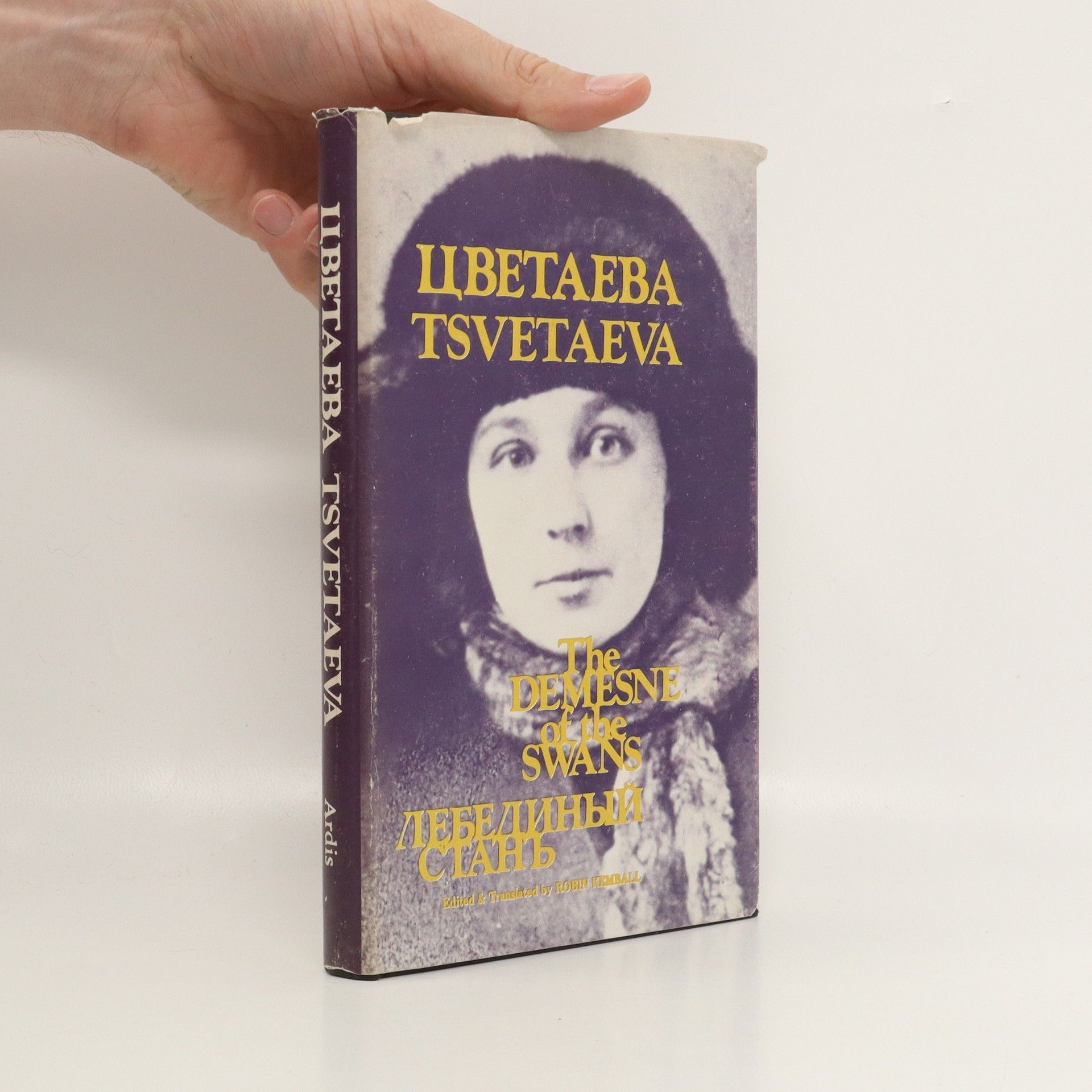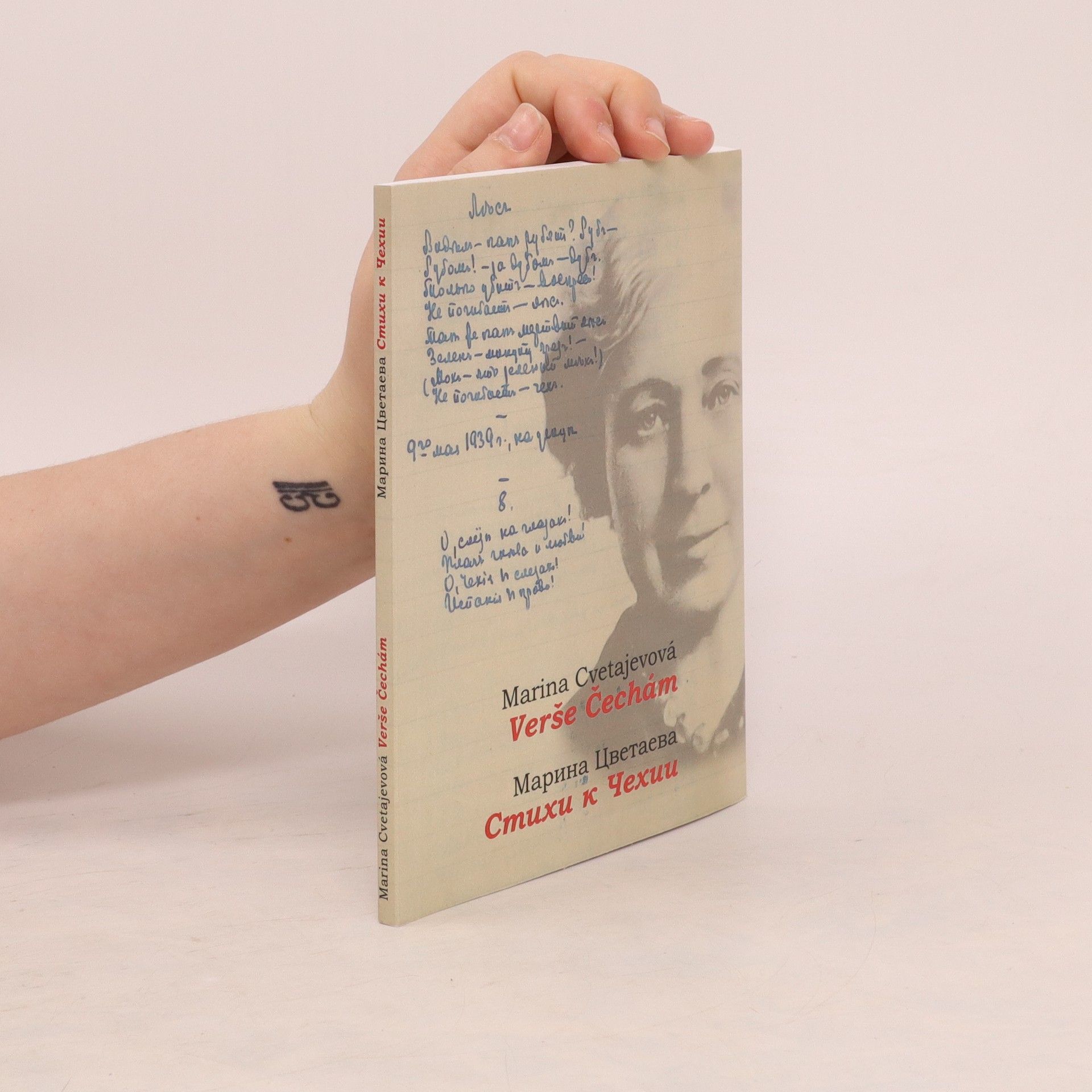Marina Cvetajevová (1892—1941), významná ruská básnířka, žila v letech 1922-1925 v Čechách (Praha, Jíloviště, Mokropsy), poté v Paříži a v roce 1939 se vrátila do Sovětského svazu. Období 1922-1925 je však v její poezii možné označit za vrcholné. S tím souvisí tradiční zájem české kulturní veřejnosti o její tvorbu, což dokazuje vydání podstatné části její poetické i prozaické tvorby v češtině. Vydání překladu mnohaleté korespondence mezi básnířkou a její přítelkyní Annou Teskovou (mimo jiné překládala básně Mariny Cvetajevové do češtiny) má proto stěžejní význam pro zájemce o hlubší poznání díla této osobnosti světové literatury.
Marina Ivanovna Cvetajeva Book order (chronological)







The collection showcases Marina Tsvetaeva's previously unpublished poems from 1912 to 1920, capturing her personal and artistic struggles during a tumultuous period in Russia. The verses reflect her relationships, particularly with poet Sonya Parnók and economist Nikodim Plutser-Sarnya, while also exploring themes of identity, loss, and cultural heritage through tributes and evocative imagery. Notably, it includes a unique cycle featuring Don Juan and Carmen, presenting some of Tsvetaeva's most significant and poignant works, now available in English for the first time.
Three of the legendary Russian dissident writer's greatest poems, two autobiographical and one based on a Russian folktale, now in a new, invigorating English translation. Three by Tsvetaeva collects three dazzling and devastating reckonings with love and the end of love by a poet celebrated for the unequaled verbal inventiveness and emotional intensity of her work. “Backstreets,” translated into English for the first time, is a retelling of a Russian fairy tale that offers a witches’ brew of temptation, bodily transformation, marriage, and murder. “Poem of the Mountain” and “Poem of the End,” perhaps the most celebrated of Marina Tsvetaeva’s poetic sequences, explore the shifting dynamics of a love affair. The voices of the lovers, the voice of the narrator, and the voice of poetry combine and recombine, circle each other and split, engaging the reader in a constantly shifting spectrum of emotion, from unbridled passion to rawest grief, and discovering at last a strange triumph in loss. Andrew Davis’s translations of Tsvetaeva bring out the wild brilliance of an incomparable artist. This English-only edition does not include the poems in their original language.
Bride of Ice
- 186 pages
- 7 hours of reading
Elaine Feinstein's ground-breaking translations of one of the most celebrated Russian poets of the twentieth century, reissued as a Carcanet Classic.
Set against the backdrop of Russia's tumultuous transition during 1917-1918, this collection captures the poignant lyricism of Tsvetaeva's poetry. Each poem serves as a gateway into her rich imagination, reflecting her deep existential inquiries amid chaos. The works grapple with complex ethical and human dilemmas, mirroring the era's upheaval. Tsvetaeva's declaration that "It befits heroes to be frozen" invites contemplation of her personal heroism during a time of profound uncertainty and impending challenges.
Poem of the End
- 164 pages
- 6 hours of reading
Tsvetaeva always regarded the narrative poem as her true challenge, and she created powerful and intensely original works in this genre. They can be seen as markers of various stages in her poetic development...
Youthful Verses
- 112 pages
- 4 hours of reading
Set between 1913 and 1915, the poems reflect Marina Tsvetaeva's vibrant life marked by newfound freedom, marriage, and motherhood. Through candid and honest verses, she explores her deep affection for a slightly older woman poet. The collection balances a troubling sense of self-denigration with sharp humor and a playful spirit, all while showcasing Tsvetaeva's exceptional formal craftsmanship.
Marina Cvetajevová (1892-1941) byla jednu z nejvýznamnějších básnířek 20. století. Pocházela ze vzdělaného prostředí a v dětství s rodiči cestovala po Evropě. V roce 1912 se vdala za vojáka a novináře Sergeje Efrona, který se postavil na stranu bělogvardějců. Rodina později žila v Československu, které Cvetajevové přirostlo k srdci, a posléze v Paříži, odkud musel manžel uprchnout, protože by vyšetřován za účast na politických vraždách ve službách ruské NKVD. Po beztrestném návratu do Ruska v roce 1937 byli Efron s dcerou zatčeni a souzeni ve vykonstruovaném procesu. Cvetajevová je následovala v 1939 a po vypuknutí války byla se synem evakuována do Tatarské ASSR, kde zoufalá Cvetajevová, jen pět neděl po popravě manžela, spáchala sebevraždu. Mezi její nejvýznamnější básnické sbírky patří Kouzelná lucerna (1912), Versty (1922), Poéma konce (1924) a Poéma hory (1924) a Verše Čechám (1939) odsuzující okupaci Německem. Tento výběr básní vychází z vydání s názvem Pražské vigilie v překladu Hany Vrbové.
Krysař
- 144 pages
- 6 hours of reading
První české vydání jednoho z nejrozsáhlejších básnických textů Mariny Cvetajevové, napsaného v roce 1925 ve Všenorech a dokončeného v Paříži, je paradoxně dosud nepřeložené. Text je jazykově složitý a politicky nabitý, což ztěžuje jeho překlad. Cvetajevová, známá svou vášnivou lyrikou, v této básni projevila specifickou vnitřní sílu, i když je psaná na motivy staré německé pohádky. Dílo se vyznačuje „lyrickou satirou“, která je hořce ironická a obsahuje politický podtext. Cvetajevová využívá legendu k filosofickému rozjímání o věčném soužení dobra a zla v lidské duši a posměchu pokrytecké měšťanské morálce. I když se tematika vztahuje k německé kultuře, popisované reálie mytického města Hammeln mají český nádech, evokující každodenní život. Politická tematika se soustředí na likvidaci krys, které symbolizují bující bolševismus. Jazyková náročnost této pasáže je experimentální a připomíná Chlebnikovův styl. Satira hádky Krysaře s konšely kritizuje vztah umění k poklidnému měšťanskému životu. Závěrečná kapitola, v níž Krysař odvádí děti do vody, je nejdojemnější a výrazně se odlišuje od ostatních částí. Cvetajevová se v textu vyznává ze svého vztahu k české zemi, ačkoliv obsahuje pouze jednu konkrétní narážku na české reálie. Celý text je prodchnut „českým duchem“.
Publikace přináší paralelní rusko-české vydání veršů Mariny Cvetajevové (1892–1941), básnířky s pohnutým osudem. Verše napsané v Paříži v letech 1938–1939 čerpají z životních osudů autorky a vzpomínek na Československo, v němž Cvetajevová žila v letech 1922–1925. Úvodní slovo napsal prof. Vladimír Svatoň. Knížka nevelkého rozsahu je určena široké kulturní veřejnosti. Dvojjazyčné vydání umožní srovnat podobu originálních veršů s kvalitou českého překladu. Jde o vůbec první kompletní vydání tohoto básnického cyklu v češtině.


